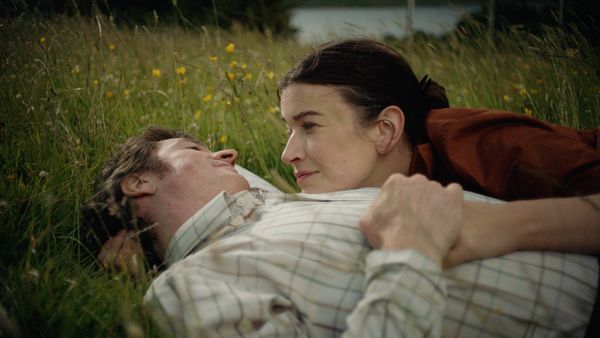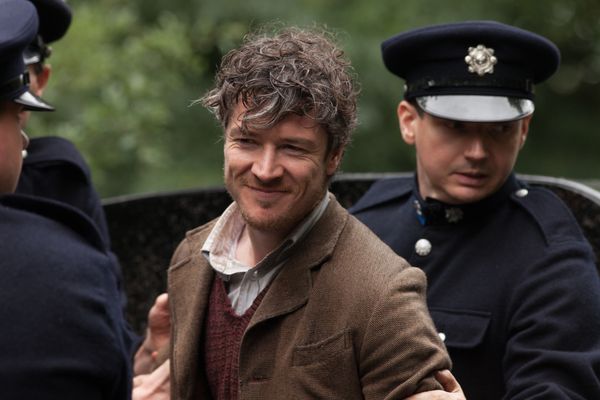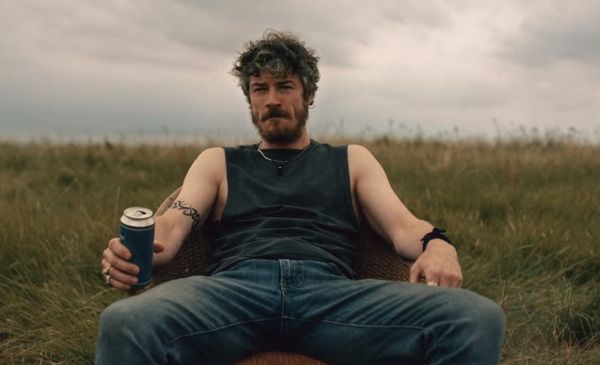 |
| Barry Ward with Anna Bederke in That The May Face The Rising Sun. Ward: 'My approach to TV and film remains the same, though, in terms of research and preparation' Photo: Conic |
The subdued charm of Ward is often a staple of his screen presence, perhaps best put to use in his emblematic role as activist Jimmy Gralton in Ken Loach’s Jimmy’s Hall (2014). Yet the actor’s career has also seen him feature in well-known TV series, anywhere from pop success like The End Of The F***ing World (2017-2019) to dark comedies like Bad Sisters (2022), and historical fiction including Britannia (2017-2021).
We sat down with Ward at Karlovy Vary Film Festival to discuss his relationship with his work, the notion of prestige and television, his love for film as a medium, as well as his keenness to work with young directors and his excitement at the new wave of self-representation that has come out of Ireland in the past years.
 |
| Barry Ward at Karlovy Vary Film Festival. On Irish cinema, he says: 'I think it's been a slow and gradual process, and now it's really flowered' Photo: Courtesy of KVIFF |
Barry Ward: I've been very lucky that I've been able to combine both TV and film. I like to mix it up and keep jumping from one to the other. There's obviously a lot more TV around now, and so a lot more opportunities to work. But I do prefer film as a medium, that’s what’s best for me. The structure and the format… You know, a TV series… I don't watch many TV series, to be honest. I find that by the very nature of their duration, they all devolve into melodrama, of which I'm not a fan. They kind of have to do that. If you want to keep a show running for six hours a season the lead character will have to find themselves in more and more melodramatic plights. It's not for me, really. But that being said, I do enjoy working in it.
My approach to TV and film remains the same, though, in terms of research and preparation. The major difference is time, really. TV is just a much faster medium. You're shooting a lot more material in a shorter space of time. And film feels more generous, I think, with time and how you can labour over it for longer and therefore in deeper ways.
DL: You also seem very keen to play in short films, when a lot of actors seem to never want to return to them after they move to features.
BW: I guess I tend to get offered quite a few. They're usually a calling card for young directors – often, they'll reach out and see if I'm available. And I do love making short movies. I love working with new, young people. They often have an enthusiasm for the work that older people have lost sometimes.
I do like that energy; I like to be around that energy. And I'm always interested in forging working relationships. It's rare that I get to work with the same directors again and again, but I love doing that because you develop a shorthand and the work improves over the years, I think. If you look at any great director, they've always had an actor that they've worked with more than others, you know. and I think the work bears testimony to that, the standard of the work. So, I'm always interested in developing new relationships with young directors, with the aim of working together a lot over the years.
 |
| Barry Ward in Jimmy's Hall. Ward: 'I was a huge fan of Ken Loach for years and years and always wanted to work with him' Photo: Entertainment One |
And I just love the fact that you can get in and out of a short movie. You do all the work and then you film it in a couple of days, and then you've got it, you've got this beautiful piece of work that you can just watch, and it's out there in the world. It's nice to be able to do it quickly and get it out soon.
DL: It’s nice to hear you say that – I think people often consider short films a less prestigious format.
BW: You know, a good short film, a good script is just like a good poem. It can be so complete. Sometimes I read a script and think, “This is absolutely perfect”. With a feature or TV, I always have some issues or problems with them. It's more difficult to sustain that level. But with a short movie, I just think sometimes about how beautiful something is. It's got a great message and I want to be a part of it.
This is a story I want to tell. And I don't look at them as being less prestigious at all. I think film is film, whatever the length. And I feel very lucky to be working in it in any capacity. I’ll continue to do more short movies.
There are great short film festivals, as well. And you know, they're regarded and in competition for the BAFTAs and Oscars. A couple of recent films I did got really far in those competitions. I think there's a level of prestige when it comes to shorts, too. I’m excited to be doing two other shorts very soon.
DL: There’s been a lot of discussion about television becoming cinematic and the border between TV and cinema blurring to some extent. As someone who started their career in television during the 90s – when television was a very specific thing, let’s say – how have you felt his change happen? Did you feel it evolve as you've been working?
BW: Yes, totally. Once upon a time the notion of prestige probably stopped certain filmmakers from making TV. But I think now, given how much TV is about, and how the streaming platforms have radically changed the game, [it’s completely different]. And there's a much better quality of people writing and making stuff for TV. Yeah, it's changed a lot. When I started out, there were only a couple of channels, you could count them on one hand. Very little work on the ground for people. Now there's a lot of it around, which is good. That level of competition means everyone's trying to outdo each other, to get the next best show. I think it's a golden era for TV, definitely.
DL: A lot of filmmakers, and actors too, are also commenting that nowadays there’s a bit more freedom in television than in feature filmmaking. At least just because there's much more opportunity to invest in a series.
BW: I'm not sure from my end as an actor, but that's probably a question for producers and show creators. But there do seem to be a lot more opportunities in TV and less in film. I went to see Charlie Kaufman speak a couple of weeks ago. He couldn't get anything made after Synecdoche, New York, and then Netflix funded his last film. Which is great – it's great that the world has another Charlie Kaufman film.
DL: Where might you find freedom then, as an actor? What would your dream role be?
BW: I don't know! I want to make movies. Yeah, I just want to make movies.
I don't know about dream roles, because I think if I knew that I'd probably write it myself. But it's funny, nice roles just keep coming and you’ve got to run with it. I'm always surprised, actually. I’ll think, “Oh, that last one was such a good role, it won't get any better than that”. And then something else lands on my step and I get surprised again.
DL: Going back a bit to the idea of work that is a bit heavier, I’d ask about one of your roles that certainly left an impression on me, in Jimmy's Hall (2014). What was it that attracted you to that role? It seemed, in a way, something very fulfilling. You’ve spoken very fondly of working with Ken Loach.
BW: I was a huge fan of Ken Loach for years and years and always wanted to work with him. He would have been in my top three directors to work with. I always thought, growing up and watching his films, that I'm the kind of actor he works with. [Working class] and untrained.
DL: In light of that, do you feel that people treat your work differently? As in, the name Ken Loach certainly weighs a lot – do you feel people haven’t been as quick to jump and watch some of your other work, including TV series?
BW: I guess different shows mean different things to different people. Certainly, when I did the Ken Loach film, that opened up a lot of doors and suddenly directors who would never have heard of me would think, “Oh wow, well, if he's good enough for Ken Loach…”. I started getting more and more work, and more high-profile work and bigger roles. Then with TV, for instance, I did a TV series called The End Of The F***ing World, which was for Channel 4 and then Netflix bought it. That was a really popular show and it also opened up a lot of doors, but for different kinds of work from what Loach would have inspired, maybe.
I think a lot of it, unfortunately, is about exposure and just being seen in things that are good, you know? That breeds more and more work. But of a certain type. After I did End Of The World, I think for my next three jobs, I was playing a person living in a caravan. Sometimes people see you in one thing and they’ll ask you, can you just do that but in ours? You have to be careful with that, and mix it up a bit.
DL: You were invited as a jury member for the Karlovy Vary International Film Festival [in 2023]. This made me wonder a bit how you view your own position as a film professional. I think sometimes Ireland and the UK can kind of function like a self-sufficient English-speaking system, a bit separate from European cinema. Do you feel that’s true?
BW: Well, in terms of festivals – festivals are kind of a world unto themselves, aren't they? But a festival here would be similar enough to the festivals there, no? As for the separation you’ve mentioned, that’s all changing, I think. With TV, at least, I think traditionally that was because national broadcasters were the only people making TV. It was segregated by default and nations made stuff in isolation. But now it's all about co-productions and there are a lot of international co-productions – and I guess more between Ireland and Europe than the UK, given that they've voted for Brexit. It's their loss, really. [With the co-productions], it's all becoming a much smaller world and a much more tight-knit community, which is great.
DL: Ireland seems to be very present on the cinema map, recently and consistently. Do you feel any kind of flux, or small wave of talent that has come out of the country recently?
BW: I think it's been a slow and gradual process, and now it's really flowered. It's been cultivated for quite a while, but it definitely feels like it's come to fruition now. Someone told me that at the Oscars [last year] something like 20% of the nominees were Irish. [Laughs]. Then I was at the BAFTAs with a TV series, Bad Sisters (2022), and it won two BAFTAs, and there was also Derry Girls (2018-2022), which picked up another two or three. We are really highly represented in film and TV. And crucially, there’s a lot of self-representation.
There have been many factors as to why, suddenly, we have all this big talent on the world stage. Some of it is about business, some of it is financial; the Irish government did a lot to attract films to be made in the country, with tax cuts and things like that. Once productions came in, people were getting jobs. Game of Thrones (2011-2019) filmed in Ireland for a long, long time. So, we have a lot of really highly experienced crews now, ready to go and all busy.
And then with actors, you know, if a young actor sees a lot of other actors doing really well, it's a real incentive. Seeing that it can be done, you get more and more wanting to do it. I think each wave inspires the next. And there's way more talent to come. No doubt.
That They May Face the Rising Sun is currently playing in UK and Irish Cinemas.






















